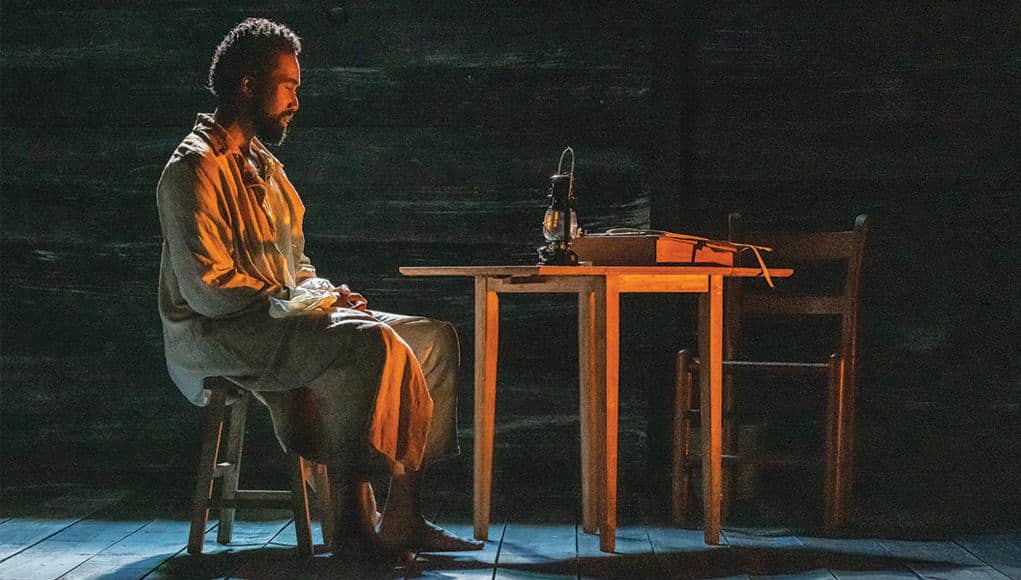by Rebecca M. Alvin
Top Image: Ricardy Fabre as Nat Turner. Photo: Michael & Suz Karchmer
Almost exactly 190 years ago, in August of 1831, Nat Turner, an enslaved African-American preacher, led a rebellion against the white establishment in Virginia, guided by what he believed were messages from God. Turner’s motivations and religious beliefs were documented in a book by white attorney Thomas R. Gray, who interviewed the activist in his jail cell just days before his execution by hanging and wrote the book The Confessions of Nat Turner, published that same year. Playwright Nathan Alan Davis takes these jailhouse confessions as the premise for his 2016 play Nat Turner in Jerusalem.
Set in the holding cell with only three characters: Nat Turner (Ricardy Fabre), Thomas R. Gray, and Turner’s jailor (both played by Robert St. Laurence), the play explores the complicated dimensions of revolution and rebellion. Turner’s revolt, like many such events in history, featured indiscriminate violence in order to highlight the inherent violence of the slavery system. So much of the dialogue between Turner and the two white men who are his only human contact in his final days demonstrates Turner’s understanding of the necessity for his actions and the two white men’s deep denial of their own complicity in a system even more violent and disturbing than the murder of unsuspecting white citizens, including children as young as an infant.
In Davis’ refusal to downplay the messiness, the ugliness of the rebellion, he gives us a more complex picture of what happened in Virginia, why it happened, why it had to happen, and therefore leads us to thinking about our present-day problems with racism and our country’s legacy of systemic oppression of non-white populations. There is so much to think about coming out of this play. The writing is tight and features a lot of religious symbolism, as Turner was deeply religious and felt God had led him to his actions, violent as they were, because living within a system of such brutality and violence was far worse. He says to Thomas Gray at one point that if Gray loved his infant daughter he would smother her to death now rather than allow her to grow up in a world that allows one group of people to dominate, abuse, and crush another group in the name of commerce. It’s a heavy moment in the play, but one that highlights the depth of Turner’s pain.
In the Wellfleet Harbor Actors Theater (WHAT) production, Davis’ powerful writing is matched by the performances by both Fabre and St. Laurence. Each actor brings to his character an unwavering commitment to fundamental beliefs that highlight both the differences and similarities in all three characters’ positions. Under Rodney Witherspoon II’s direction, this play is marvelously performed, easily holding the audience’s attention throughout its uninterrupted 90 minutes.
We know Turner’s fate, we know what happened in real life, but the intention is to make us think about what happens next. Is there a way to rebel without murder? Do such “insurrections” cause further damage to a cause or an eventual way out of bondage, terror, and morally bankrupt institutions? What can be done now?
Nat Turner in Jerusalem is performed at WHAT’s outdoor Garden Stage, 2357 Rte. 6, Wellfleet, Wednesdays – Sundays, 7 p.m. through September 5. Masks are required. For tickets and information call 508.349.9428 or visit what.org.











